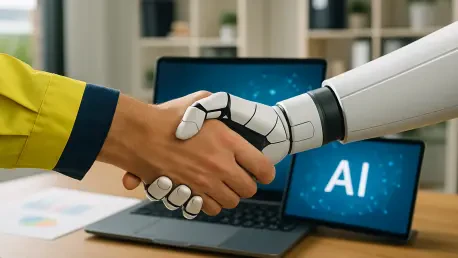In an era where technology continues to reshape the workplace, a striking shift is emerging in how employees perceive the role of artificial intelligence (AI) in management, with recent surveys revealing a growing acceptance of AI as a tool for enhancing fairness and efficiency in decision-making. Yet, this enthusiasm is carefully balanced by a deep-rooted need for human oversight. Employees are increasingly open to AI-driven processes in areas like hiring and performance evaluations, appreciating the potential for reduced bias. However, the emotional intelligence and ethical judgment that human leaders bring to the table remain irreplaceable in the eyes of many. This evolving dynamic paints a picture of a workforce ready to embrace innovation, but only with safeguards that preserve the personal connection and trust essential to a thriving work environment. The challenge lies in striking a balance that leverages AI’s strengths while ensuring human values are not sidelined.
Growing Trust in AI for Workplace Decisions
The acceptance of AI in workplace management is gaining momentum, driven by its promise of objectivity. Surveys indicate that a significant majority of workers—around two-thirds—believe AI-led management could foster fairer and more efficient workplaces by minimizing human bias. This trust extends to critical areas such as hiring, firing, and budgeting, where nearly three-quarters of respondents support AI involvement. Many employees also see AI as a tool for setting unbiased performance goals and delivering objective feedback, areas often clouded by personal prejudices in traditional setups. This growing confidence reflects a broader recognition that technology can streamline processes and introduce a level of impartiality that is sometimes lacking in human decision-making, paving the way for more equitable professional environments where merit can take center stage.
While the optimism surrounding AI’s capabilities is evident, it is not without boundaries. A notable portion of the workforce—about one-third—is even open to reporting directly to an AI manager, a testament to the trust in technology’s potential. However, this openness is tempered by concerns over specific applications of AI, particularly in roles that require nuanced judgment. Employees value the idea of AI enhancing systems, but there remains a cautious approach to fully relinquishing control. Issues such as data privacy and the risk of over-reliance on algorithms loom large, prompting calls for clear guidelines on how AI is implemented. The sentiment underscores a desire for technology to act as a supportive tool rather than a standalone authority, ensuring that human oversight remains a critical component in maintaining workplace integrity and trust.
Preference for Human Leadership in Key Areas
Despite the growing acceptance of AI, a strong preference for human leadership persists in contexts where empathy and ethical considerations are paramount. A substantial majority of workers—over 60%—still favor human bosses for roles that involve inspiring teams and navigating emotional complexities. Many argue that only humans can truly understand the subtleties of motivation and morale, elements that are vital to a cohesive work environment. This perspective highlights a clear divide: while AI may excel in data-driven decisions, it often falls short in fostering the personal connections that underpin effective leadership. Employees seem to crave a balance where technology handles objective tasks, but human leaders remain at the helm for matters of heart and principle, ensuring that workplaces retain their human essence.
This dichotomy extends to concerns about the impersonal nature of AI-driven management. Nearly a third of surveyed workers express apprehension that relying on AI could make workplaces colder and more stressful, stripping away the warmth of human interaction. Additionally, fears of surveillance and data misuse are prevalent, with a significant number of employees worried about how their information might be handled. Trust emerges as a pivotal issue, with a vast majority indicating that transparency in AI usage would greatly enhance their confidence in employers. These concerns point to a critical need for companies to address privacy and emotional well-being when integrating AI, ensuring that technology serves as an enabler rather than a barrier to a supportive and trusting workplace culture.
Balancing AI and Human Roles for the Future
The trend toward hybrid management models is becoming increasingly apparent as companies adopt AI at a rapid pace. A growing number of workers—close to half—express greater trust in AI than in co-workers for certain tasks, while a sizable minority even prefer AI managers over human ones in specific scenarios. Yet, the overarching sentiment leans toward a collaborative approach where AI supports rather than replaces human leaders. Industry experts emphasize the importance of thoughtful integration, suggesting that AI should enhance existing systems and promote fairness while maintaining the active presence of human leaders skilled in leveraging technology. This balanced model aims to harness AI’s analytical power while preserving the irreplaceable qualities of human judgment and interpersonal connection.
Looking back, the journey toward integrating AI into management roles revealed a workforce that was cautiously optimistic. Employees valued the strides made in improving fairness and efficiency through AI but remained steadfast in their attachment to human leaders for emotional intelligence and ethical guidance. Concerns over privacy and the risk of impersonal workplaces underscored the importance of transparency and careful implementation. As a next step, organizations were encouraged to prioritize clear communication about AI systems, establish robust safeguards for data protection, and invest in training leaders to work alongside AI tools. The path forward appeared to lie in a synergy where technology and humanity complemented each other, ensuring that workplaces of tomorrow would benefit from both precision and compassion.









